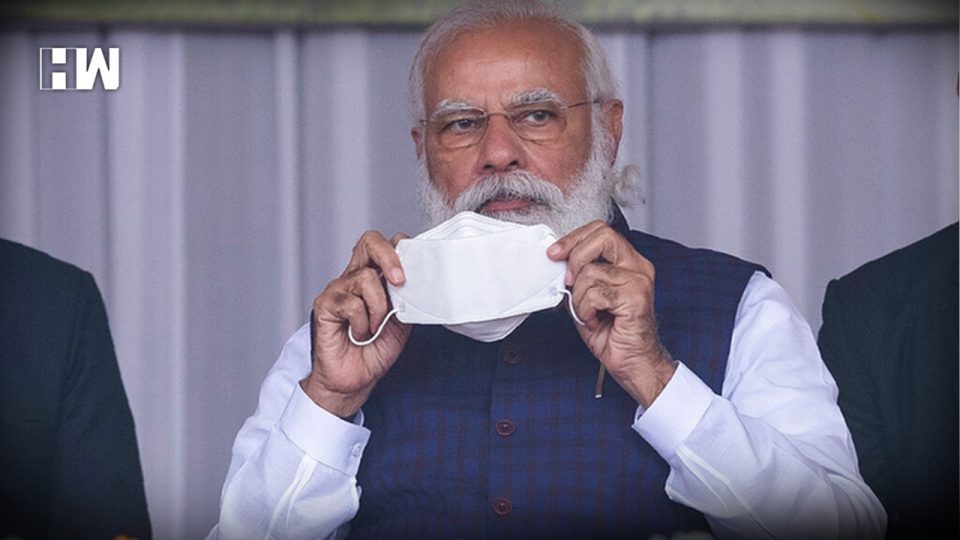“Future historians will judge Mr Modi harshly if he continues with the exceptionalist views that have led to a disastrous public health outcome,” Guardian said.
As India scrambles to contain the second wave of the Coronavirus pandemic, the healthcare system of the country has been overwhelmed to its limit. There has been a steep rise in the daily cases of infections across India for the last few weeks, with the country now reporting over 3 lakh cases a day for the fifth straight day. India has broken all the earlier records of daily cases across the world.
Thousands of Covid-19 patients in India have been struggling to find hospital beds, oxygen cylinders, and potentially life-saving medication amidst an acute shortage of medical resources in the country.
As the government tries to keep up with the massive second wave of infections, here’s how the international media has reported India’s health crisis.
The Australian

The World News page of The Australian was doing rounds on social media on Saturday, as the newspaper pinpointed the blame on Indian Prime Minister Narendra Modi with the title: ‘Modi leads India out of lockdown…and into a viral apocalypse’.
In its aggressive criticism of India’s handling of the Covid-19 pandemic, the newspaper said: “Arrogance, hyper-nationalism and bureaucratic incompetence have combined to create a crisis of epic proportions, critics say, as India’s crowd-loving PM basks while citizens literally suffocate.”
Also Read: “Someone Who Has Family Member On Death Bed Doesn’t Care About Cricket”: Adam Zampa Explains Why He Quit IPL
The Washington Post
Calling India’s new wave of Covid-19 “as avoidable as it is tragic”, The Washington Post stated that the sudden wave was caused by India relaxing restrictions too soon. “Tens of thousands of spectators were allowed to fill stadiums for cricket matches; movie theaters were opened; and the government permitted enormous religious gatherings such as the Kumbh Mela, a festival in which millions of Hindus gathered to bathe in the river Ganges,” the newspaper said. “India is not a faraway problem. In pandemic time and distance, every place is nearby.”
The Guardian
Shredding Indian Prime Minister Narendra Modi for the current condition, The Guardian in its editorial wrote, “The Indian prime minister’s overconfidence lies behind the country’s disastrous Covid-19 response.” Guardian is of the view that “the Indian prime minister suffers from overconfidence in his own instincts and pooh-poohs expert advice” and “the buck stops with him”.
“He should acknowledge and make amends for mistakes that have caused enormous suffering. He needs to engage with experts on how to uphold restrictions; ensure government delivery matches promises; and drop the sectarian ideology that divides when unity is required. Future historians will judge Mr Modi harshly if he continues with the exceptionalist views that have led to a disastrous public health outcome,” Guardian said.
The New York Times
According to an article published in the New York Times, the crisis was deepened by missteps and complacency. “Complacency and government missteps have helped turned India from a seeming success story into one of the world’s worst-hit places, experts say. And epidemiologists warn that continuing failure in India would have global implications,” the article said. India’s vaccination rollout was “late and riddled with setbacks”, it further added.
“What India needs now, epidemiologists and experts say, is concerted and consistent leadership to contain infections and buy time to make vaccinations more widely available and faster,” the NYT article stated.
BBC
“Cases have surged during India’s second wave, driven by a number of factors. Health protocols have been lax, with mask mandates sporadically enforced,” a BBC report stated. The reputed news organisation also attributed the sudden rise in cases to millions attending the Kumbh Mela held in Haridwar of Uttarakhand.
“India’s healthcare system is buckling as a record surge in Covid-19 cases puts pressure on hospital beds and drains oxygen supplies. Families are left pleading for their relatives who are desperately ill, with some patients left untreated for hours,” the report read.
As an independent media platform, we do not take advertisements from governments and corporate houses. It is you, our readers, who have supported us on our journey to do honest and unbiased journalism. Please contribute, so that we can continue to do the same in future.

